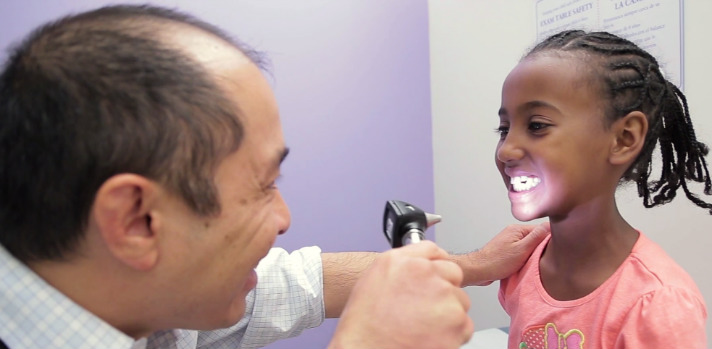Ranked No. 4 in the Nation
In the 2022-23 Best Children’s Hospitals rankings by U.S. News & World Report, our section was ranked fourth in the nation in the specialty area of Gastroenterology and Gastrointestinal Surgery.Welcome to Gastroenterology, Hepatology and Nutrition

Fellowship Program
Our highly-rated fellowship program is one of a handful funded by the National Institutes of Health.The Section of Gastroenterology, Hepatology and Nutrition is a national leader in innovative clinical practice, developing and testing new diagnostics and treatments, and training the next generation of clinicians and researchers.
We are dedicated to:
- Providing state-of-the-art family-based clinical care
- Promoting discovery through cutting-edge basic, clinical, and translational research, and
- Being at the forefront of training pediatric gastroenterology and hepatology fellows and pediatric residents.
Clinical and research programs address all aspects of digestive diseases, including those involving the esophagus, intestinal tract, liver, and pancreas.
- Our faculty provide national leadership in many NIH-funded research networks and professional organizations.
- Our highly-rated fellowship program is one of a handful funded by the NIH.
Most of our clinical services are provided at Children's Hospital Colorado, in Aurora and include many outreach and satellite clinics, enabling our multidisciplinary clinical team to see approximately 17,000 outpatient visits per year and perform close to 4,000 GI procedures. We have the only dedicated pediatric GI procedure unit in the region.
Our research programs (funded by the NIH, foundations, and philanthropy) align with our clinical programs and focus on liver diseases, liver failure, and liver transplantation, inflammatory bowel disease, eosinophilic diseases of the GI tract, childhood obesity, short bowel syndrome, and celiac disease.
Leadership

Glenn Furuta MD
Professor of Pediatrics and Head, Section of Gastroenterology, Hepatology & Nutrition Section Head
Digestive Health Institute and Director, Gastrointestinal Eosinophilic Diseases Program, Children's Hospital Colorado
Gastroenterology, Hepatology and Nutrition at Children's Hospital Colorado
The Section of Gastroenterology,
Hepatology and Nutrition offers a wide variety of clinical services for children with digestive diseases, liver and pancreas disorders, and complex nutritional problems, both in our community and from out of state.
Services are offered at
Children's Hospital Colorado, metro and regional clinics in Colorado, and a regional clinic in Montana.
Please call the GI Office at (720) 777-6669 (Option 2) for more information about these services.
On-Campus Services -- Clinics
- Aerodigestive Program
- Celiac Disease
- Gastrointestinal Eosinophilic Diseases Program
- Inflammatory Bowel Disease Referral Clinic
- Intestinal Rehab Clinic
- Neurogastroenterology and Motility Program
- Nutrition Services Clinic
- Pediatric Gastroenterology Clinic
- Pediatric Liver Center/Liver Transplantation
- Weight Management Clinic - Lifestyles Influencing Fitness and Eating
On-Campus Services -- Diagnostics
GI Procedure Unit
The GI Procedure Unit, located in the Children's Hospital Colorado Procedure Center on the 1st floor of the hospital, has two fully equipped endoscopy rooms designed especially for children and staffed by pediatric anesthesiologists as needed. There is a separate room for procedures that do not require sedation such as breath tests, video capsule endoscopy, and pH or pH/impedance testing. The unit operates Monday through Friday, 8:00 am to 4:30 pm. After-hours procedures are performed in the hospital operating room. Specialized procedures performed in this unit include:
The GI Procedure Unit, located in the Children's Hospital Colorado Procedure Center on the 1st floor of the hospital, has two fully equipped endoscopy rooms designed especially for children and staffed by pediatric anesthesiologists as needed. There is a separate room for procedures that do not require sedation such as breath tests, video capsule endoscopy, and pH or pH/impedance testing. The unit operates Monday through Friday, 8:00 am to 4:30 pm. After-hours procedures are performed in the hospital operating room. Specialized procedures performed in this unit include:
- Breath hydrogen testing
- Colonoscopy
- Endoscopy of the upper GI tract
- ERCP (endoscopic retrograde cholangiopancreatography)
- Esophageal pH monitoring and impedance/pH monitoring
- Esophageal stricture management (dilation, injection, stenting)
- Gastrostomy tube change
- Liver biopsy
- Percutaneous endoscopic gastrostomy tube placement
- Proctosigmoidoscopy
- Sigmoidoscopy - flexible
- Single balloon enteroscopy
- Small bowel biopsy
- Polypectomy
- Paracentesis
- Variceal management
- Urease breath-testing for H pylori infection
- Video capsule endoscopy
Off-Campus Services -- Inside Colorado
- Care by Children's Hospital Colorado, Littleton
- Care by Children's Hospital Colorado, Lutheran
- Children's Hospital Colorado North Campus, Broomfield
- Children's Hospital Colorado at Parker Adventist Hospital
- Children's Hospital Colorado at Saint Joseph Hospital
- Pediatric Specialty GI Clinic - Greeley
- Pediatric Specialty GI Clinic - Colorado Springs
Visit the locations page on the Children's Colorado website to learn more.
The Section of Pediatric Gastroenterology, Hepatology and Nutrition of the University of Colorado School of Medicine Department of Pediatrics in Children's Hospital Colorado offers a three-year, ACGME-approved (Accreditation Council of Graduate Medical Education) fellowship in pediatric gastroenterology, hepatology and nutrition.
We also offer a one-year pediatric transplant hepatology fellowship.
The three-year fellowship program is designed to provide physicians who are board eligible or certified in pediatrics with in-depth clinical and research training in pediatric gastroenterology, hepatology and nutrition that will prepare them for a career in academic medicine and clinical practice.
Clinical training during the fellowship includes inpatient and outpatient experiences with common and unusual problems involving the esophagus, gastrointestinal tract, pancreas, and hepatobiliary system and normal and abnormal nutrition in childhood. Emphasis is placed on understanding the scientific and pathophysiologic basis for these disorders, assessing the best evidence and best practices available, defining a diagnostic and treatment plan, and assessing longitudinal outcomes. Also stressed are addressing the effects of acute and chronic gastrointestinal, hepatic, and nutritional problems on growth and development, quality of life, the psycho-behavioral health of children and the effect on their families. The second and third years of fellowship are devoted to research training and experience as well as continued clinical training. Please see our fellowship curriculum for detailed information.
Training for pediatric residents and other residents involves clinical experiences in inpatient, outpatient, and procedural aspects of pediatric gastroenterology, hepatology and nutrition. Additional development of clinical and/ or basic research skills is optional.
Pediatric gastroenterology, hepatology and nutrition is an important part of the pediatric clerkship curriculum for third-year medical students at University of Colorado School of Medicine. Our faculty provide a lecture in gastroenterology as part of the clerkship's core lecture series and supervise medical students on the inpatient pediatric services.
A fourth-year medical student elective in pediatric gastroenterology, hepatology and nutrition emphasizes the outpatient evaluation and management of common and uncommon clinical problems, as well as time on the inpatient and consultation service and GI Procedure Unit.
The Section includes many of the leading researchers in pediatric gastroenterology, hepatology and nutrition in the country. Research in the Section bridges across basic sciences, translational medicine, and clinical research related to pediatric gastrointestinal and liver diseases. Ongoing laboratory research includes investigations of the roles of cell signaling, mitochondrial dysfunction, and oxidative stress in hepatocyte injury in the cholestatic and fatty liver; the role of innate immunity in parenteral-nutrition-associated liver injury; characterization of the pathogenesis of biliary atresia in a mouse model; the role of eosinophils in cellular injury and remodeling of the esophagous and intestines; vaccine development for diabetes prevention; and mechanisms of immunologic injury in a mouse model of celiac disease.
Clinical research includes clinical trials of new therapies for hepatitis B and C; evaluation of the genetics, epidemiology and outcomes of celiac disease; investigations of the etiology and development of new diagnostics and optimal therapies of eosinophilic esophagitis; development of new therapies for fibrotic and cholestatic liver diseases; studies of bone mineral metabolism in chronic liver disease; investigation of the etiology, pathogenesis, and outcomes of biliary atresia; a clinical trial of corticosteroids in biliary atresia; a study of the cause of and a clinical trial in acute liver failure in children; diagnosis and treatment of liver disease associated with cystic fibrosis; new treatments for inflammatory bowel disease; evaluation of outcomes of pediatric liver transplant recipients; and a longitudinal study of genetic causes of intrahepatic cholestatic liver diseases in childhood.